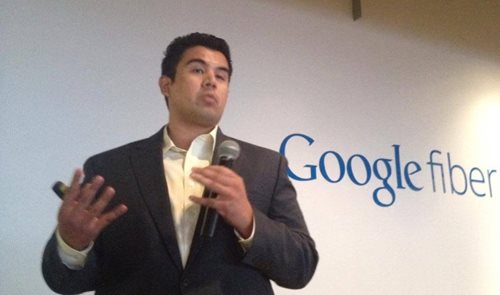
Community Development Specialist Ernesto Marquez of the Hispanic Economic Development Corporation of Kansas City
With broadband-driven initiatives in advanced areas like next gen app development, telemedicine and smart city living, Kansas City is well into owning its status as a gigabit city.
But with this quantum-leap evolution comes responsibility. Here at KC Digital Drive, we support a number of local organizations that work to bridge the digital divide — to ensure that all citizens have the skills and access needed to take advantage of the current fiber-empowered moment. And we’re in good company.
The Kansas City Digital Inclusion Fund (KCDIF for short) was created to ensure that residents who lack the access, financial resources or digital literacy skills needed to rise upward with the gigabit tide don’t get left in its wake.
On August 7, 2014, at the Google Fiber Space in Kansas City, Mo., around 80 people gathered to hear stories of success from the first round of organizations to receive grants from the fund.
There were a lot of great stories to share. Here are a few of the many highlights:
Kicking things off, ArtsTechKC
Following a joyful testimonial from a 60-something grandmother who recently overcame her fear of computers, Connecting for Good‘s Michael Liimatta presented compelling updates of how his nonprofit has provided computer literacy training to 700 Kansas Citians since receiving the KCDIF grant. They have worked with 2,000 total students since the group’s inception in late 2012. Connecting for Good has also built a robust refurbishing service, churning out 200 fixed-up computers a month out of two different shops.
Next, the Hispanic Economic Development Corporation of Kansas City‘s Ernesto Marquez
began two years ago as a MacArthur Foundation grantee and has grown, thanks to the KCDIF, into a roving maker lab for teens featuring graphic design software, digital recording programs worthy of the music industry and 3D printing. Aided by able volunteers from the community, KCDML embodies the HOMAGO concept of letting teens learn through “Hanging Out, Messing Around, and Geeking Out.” This approach, explained director Andrea Ellis, allows youth a comfortable path from casual observer, to engaged user, to trainer of peers.
Closing the day’s presentations Trinity Community Church in Kansas City, Kan., discussed its work bringing a small, mostly female, Hispanic service population up to digital speed. Though not as giant an effort as some of the others, Trinity Church’s presentation ended with a heartwarming testimonial from a mother of four who spoke only Spanish. “In order to provide for my children, I had to start improving myself as an individual,” she said, speaking through a translator.
All of the day’s Digital Inclusion Fund grant recipients have clearly brought great individual and community-wide empowerment to areas of Kansas City that could easily have been neglected as more connected parts of town have powered ahead.
And best of all, there’s room for even more.
The Greater Kansas City Community Foundation, which manages the fund, is seeking applications for another round of grants. Local nonprofit organizations that demonstrably bridge the digital divide and meet certain requirements are encouraged to apply. To find out the requirements and submit an application, visit gkccf.org.
